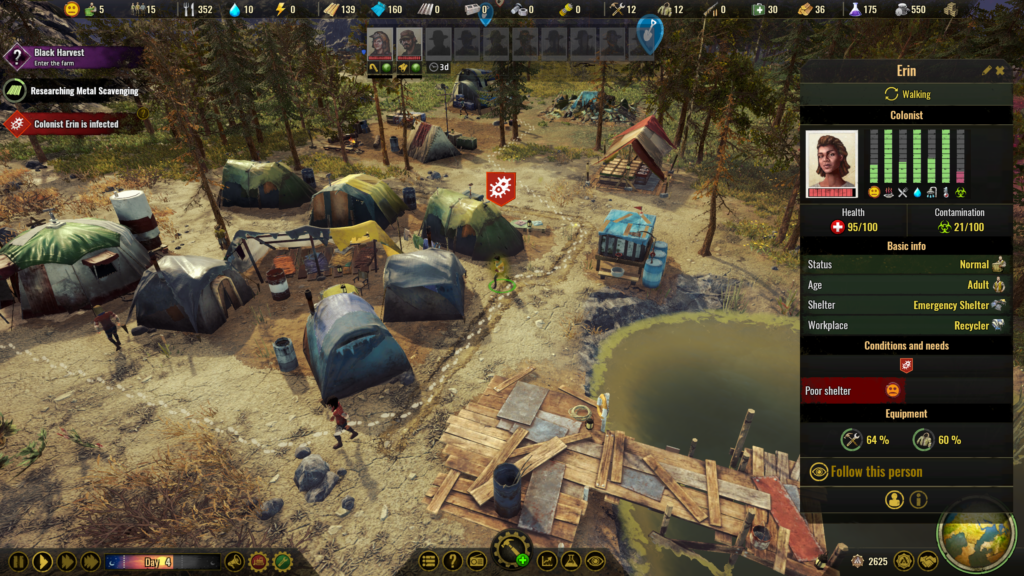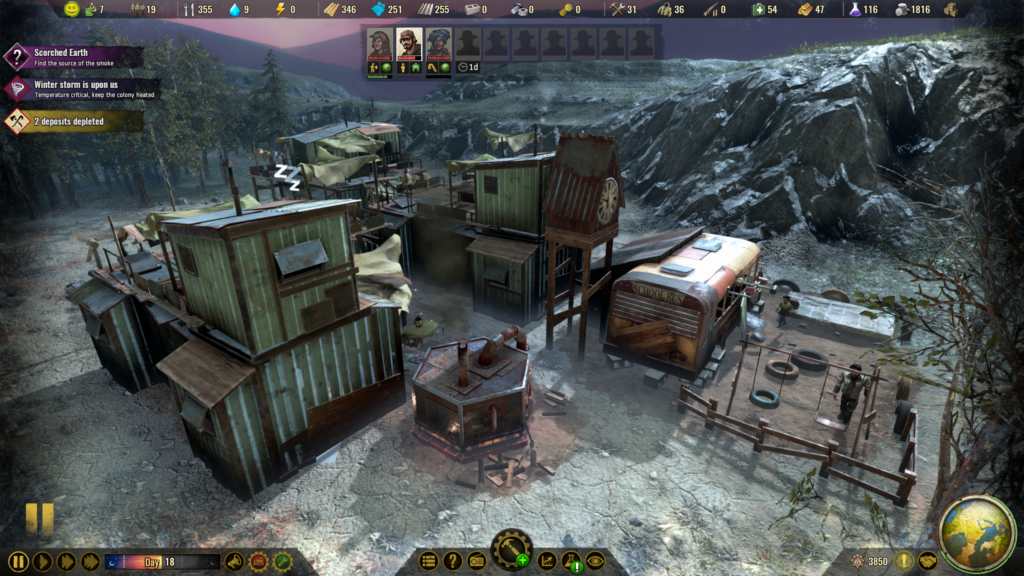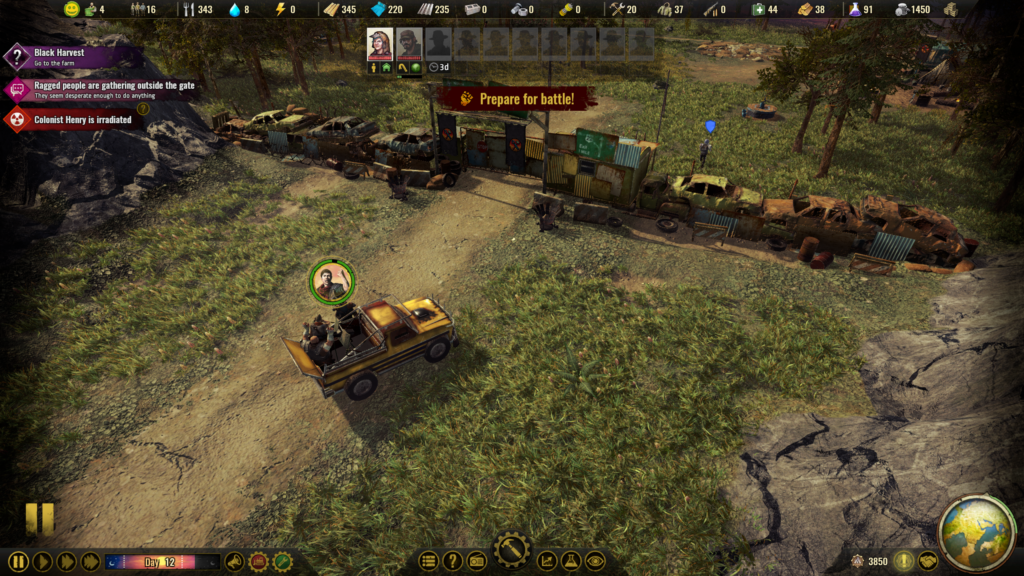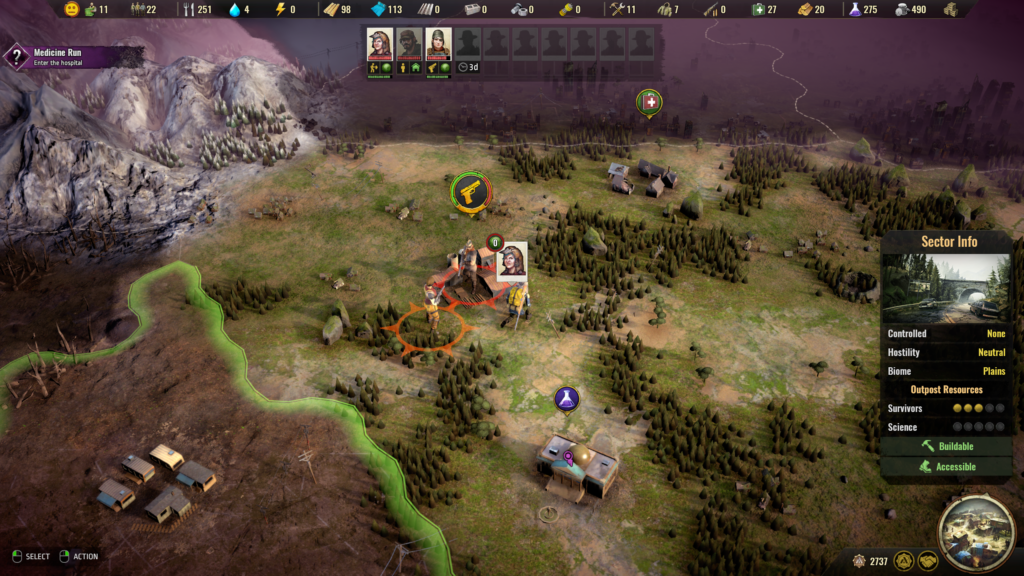
This was another free game on Epic that I picked up some time ago and would never have bought on my own. It’s amusing because gamers have been talking up the potential of post-apocalyptic builder games for ages and now we have a whole bunch of them coming out. Unfortunately this one is as bland as you can get, with mechanics similar to any other city building game and very few elements that are in-theme. I spent some time getting to know how it works but the whole time I was thinking how much better Frostpunk was in every way and so dropped it pretty quick.
The game is rather non-specific in exactly how the world ended but it seems to have involved both meteors falling from the sky and nuclear warfare. The upshot is that you have a piece of land on which to build your new settlement, some of which is fertile, some barren and some covered by pollution which can kill your settlers. Occasionally you’ll get hit by catastrophic events which can be thought of as aftershocks of whatever destroyed the world. These can include a cloud of nuclear fallout sweeping in, a meteor shower and winter storms. Through it all, you do the usual of building shelters for your people, making sure that they have enough food and water and medical care. But your settlement isn’t fully self-sufficient so you’ll also need to send our specialists to explore the strategic map and collect resources from surrounding areas. Do a good job and your settlement will grow and prosper and maybe reach some modicum of proper civilization. Fail and your people will die, often in droves.

All this is fairly standard stuff whether in terms of setting or mechanics. Buildings and roads are all placed onto a square grid. You only get the one piece of land that is randomly generated at the start of the game to build your settlement, even if most of it is covered by the fog of war at first. Your citizens all have the standard needs, except that there is a long list of ailments they can be afflicted. If they repeatedly walk through a patch of pollution for example, they’ll soon be irradiated and visibly glow. They’ll have sex and reproduce too, though they’re less likely to do so when the living conditions are cramped. The one innovation it has is that some of your citizens are specialists, which effectively makes them superhuman. They’re immune to radiation, which lets them gather resources that are inside patches of pollution, and you can order them around on the map to fight enemies like an RTS game. On the strategic map, they’re who you send out to scout and scour remote locations of their resources, sometimes fighting bandits in the way if necessary. It’s all abstracted and very clunky.
The tech tree you can research is quite deep and I believe you can build a settlement housing up to hundreds of citizens. I didn’t get that far but you can eventually build things like solar panels, electronic workshops, equip your guys with guns and the like. So I can understand how some fans can find the builder aspect satisfying. Yet there are so many other games that are better than this in every way. If you wanted to manage the lives of your citizens in detail, you’d play something like RimWorld. If you wanted to build a large logistics chain, you’d play something like Factorio. It even makes poor use of the post-apocalyptic theme. I’d expect such a game to involve repurposing and repairing existing buildings for all kinds of uses, possibly in some kind of city. What we get instead a huge piece of land to build on, like any other builder game, and the ruins are just repositories of wood, plastic, concrete and other materials you can mine. This is the most boring, uninspired implementation of the genre I can imagine.

Most frustrating of all is that it does so much that Frostpunk does already, but worse in pretty much every way. In fact, going into the scenarios, I see that there are only two of them and both deal with a freezing world apocalypse. Sure, this one has more in the way of catastrophes to deal with but there’s nothing special about them as it’s usually just a matter of ensuring that you have enough resources to in stock to survive. Meanwhile this game has a burner unit that heats up all your buildings in a radius just like Frostpunk and the way you send out specialists somewhat resembles the expeditions in the older game. Yet Frostpunk completely revolves around heat management including having a radial grid and many more heating options. It’s also far better written and thematically consistent than this one. It’s ridiculous for example that there is a logging camp building here that transforms wood into firewood, and a lumber yard building that chops down trees to get wood.
To add insult to injury, the game doesn’t even look good. Since this is set in a post-apocalyptic world, the palette is all drab browns and greens which is understandable. Yet the art and graphics are all just serviceable and nothing at all stands out. There’s so little personality in it and no life in the little guys running about. The combat is downright silly as you see your specialists engage with critters while the other critters are completely helpless. It’s an ugly, uninteresting game with mechanics cobbled from elsewhere and seems to have no spirit of its own. As far as I can tell, the challenge comes from limiting the amount of resources available and the severity of the catastrophes that randomly happen from time to time. Otherwise, it’s pretty straightforward to build your settlement as you please and there’s no real complexity in it.

Anyway I noped out of this pretty quick once I realized that I’d much rather just be playing Frostpunk instead. In fact, I’d decided not to pay attention to the upcoming Frostpunk 2 because I so rarely like sequels but this had me reexamine that decision. Even the ominous thrum of the central generator in that game had so much personality compared to this. Surviving the Aftermath is a game that works and makes no major mistakes, but it’s so solidly inferior compared against other titles that I don’t know why anyone would play it.